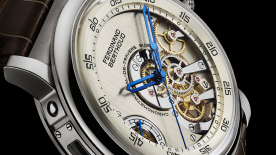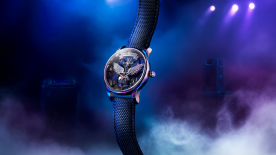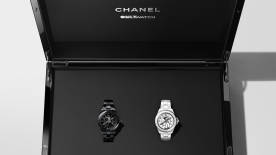Manufacture Royale, a young, dynamic creator of exceptional watches, with just a touch of insolence, intends making its mark in the contemporary watch-making world. Unashamedly elitist, the company has set itself the objective of pushing the limits of watch-making standards so as to offer a watch to the connoisseur that will stand the test of time and become, quite simply, the reference by which all others will be judged.
By taking the name of Manufacture Royale, the company pays tribute to Voltaire who, one tends to forget, was not only a famous writer, but also a remarkable businessman. During his long stay in Ferney, close to Geneva, he created a thriving watch-making business, destined to produce timepieces for the social elite, and which he hoped would help towards the creation of the ideal society for which the broad outlines can be found in his literary output.
The launch of the Opera timepiece, the first watch with repeater and tourbillon going way beyond the classic standards in terms of creation, marks the beginning of a remarkable adventure for a company simply obsessed with perfection, and having as ambition to follow in the famous writer's footsteps when, in 1773, he wrote: "the universe troubles me, for I cannot imagine such a perfect timepiece existing without a master craftsman to make it work”.
Manufacture Royale: Tribute to Voltaire
November 21st, 1694 was when Voltaire, born François-Marie Arouet, of middle-class parents with some aspirations of joining the nobility after acquiring a notary's office, first saw the light of day. He is famous for a brilliant career as a man of letters, but much less so as a successful businessman, trading in luxury items and, in particular, watches.
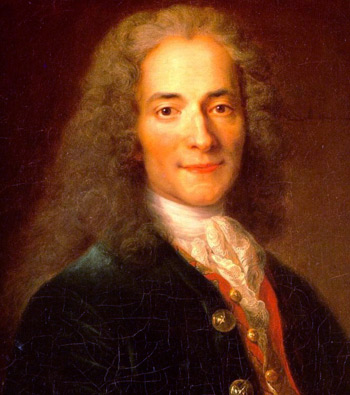
A brilliant student, he was very soon picked out by the more liberal-minded nobility of the age, who soon welcomed him into their circles. Turbulent, and not a little insolent and sarcastic, the author and poet was widely recognized and appreciated from around 1723 onwards. Of his prodigious output, one really only knows a very small part, and one also forgets that he demonstrated amazing business acumen from a very early age.
This ability to spot future trends was no doubt acquired during his exile in London. During the two years, starting in November 1726, that he spent there, he would meet all the eminent minds of the age including, no doubt, the astronomer and watch-maker, George Graham. He would have felt the first stirrings of the industrial revolution, and clearly he understood the enormous potential that watch-making could have in the changing world economy.
An industrial visionary
As someone who frequented the court (when he wasn't trying to avoid it), and as a keen observer of those who moved in those circles, Voltaire was well aware how much the aristocracy in the Age of Enlightenment were taken with philosophy and the sciences, especially the world of watch-making.
It is from Voltaire's time that the watch became the piece of male jewelry which every member of court needed, to be worn with a certain degree of ostentation, and of which he needed several versions. In addition, such a man of letters could not but be aware that the 'Encyclopedia, or a systematic dictionary of the sciences, arts, and crafts' was in preparation by Diderot and d'Alembert (first publication was in 1751). And he would certainly know that the longest article in this savants' 'bible' was devoted to the art of watch-making.
One knows Voltaire for his writing and his penchant for imposing his superior intellect at court, but one knows far less about his capacity as a super salesman. Such an idea is so far removed from what we think of intellectuals that this part of Voltaire's make-up has quite simply been ignored. However, when he set off for the court of Frederic II of Prussia in 1750, he took with him a large range of those typical French products most sought after by the aristocracy of the time, with the idea of selling as much as possible or of using them to curry favor with the great and powerful. Transport being what it was at the time, it was important that what he took was small, light and with very high value add.
Super salesman
Following his trip to the court of Frederic II, Voltaire, convinced of the need to marry the useful to the desirable, decided to settle in a place which most people thought of as a sort of retreat. However, his decision in 1758 to set up in Ferney, a village of just forty souls close to Geneva, was well thought through, since it offered several advantages.
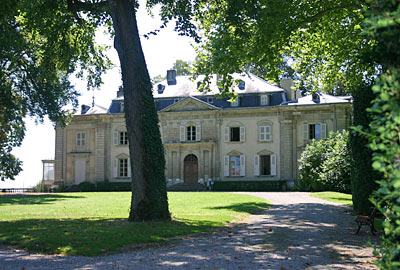
The first of these was that the garden of his manor house marked the frontier with the then independent Geneva Republic. Thus, in dire necessity he could always escape into neutral territory. But this was certainly not the main reason for choosing such a region, considered by many as a real backwater with no future, but which had started to be thought of as an area with a potential for attracting members of acceptable society following the scientific works on the surrounding mountains by the Englishman, William Windham.
Voltaire was aware that Swiss watch-making was not up to much and that, in the 1750s, the great names in the craft were French or English. But he also knew - he was someone who kept himself well-informed - that recently, in the Jura mountains, a certain number of local watch-makers had started to produce high-quality articles at prices which significantly undercut those demanded by the master craftsmen of Europe's capitals. Clearly, the business potential offered by the possibility to buy high quality watches and to sell them on with a sizeable mark-up also helped Voltaire choose this otherwise inhospitable location.
Meet the demand
One should not be surprised to find that, hardly had he set foot in Ferney, he concentrated his efforts in the manufacture of two items highly prized in the courts of eighteenth century Europe - silk stockings and watches. These two products had three inestimable qualities in common: they were expensive, fashionable and could be transported in quantity in a trunk without significantly increasing the weight. And in addition, they could be made by local people since the two activities were already part of their expertise. In fact, the local craftsmen in the valleys around Cluses and in the Swiss Jura had long since become masters in the art of weaving and lace-making.
As for watch-making, Voltaire was able to take advantage of a disagreement between the city of Geneva and its craftsmen, and attract a certain number of those to Ferney. Thus, with the backing of a highly-qualified workforce, Voltaire was able to grow his business and the fame of the town - nowadays known as Ferney-Voltaire - but also those of the craftsmen of the little Geneva Republic.
And Geneva watched with interest the success of the watch-making in Ferney. Based on this, Voltaire was able to persuade the Genevois to concentrate their enameling activities around watch and clock making and to offer watches comprising complicated innovations such as ringing and alarm mechanisms, much in fashion during the second half of the 18th century.
From trying to transform a village into an ‘ideal society', like other idealists tried to do some years later in Salines d'Arc and Senans in the Doubs department of France (designed by the architect Claude-Nicholas Ledoux in 1762), a now world-renowned industry was born. It is to pay homage to one of the fathers of modern watch-making that the young Manufacture Royale presents a creation that Voltaire would certainly have appreciated as it combines the know-how of yesteryear with modern day skills married to an ultramodern design that will guarantee sustainability.


